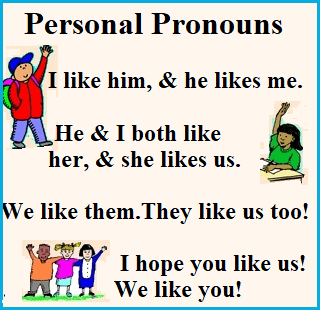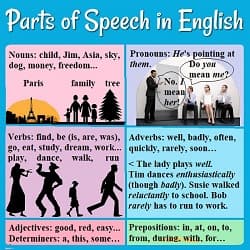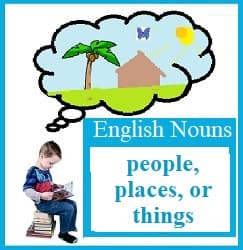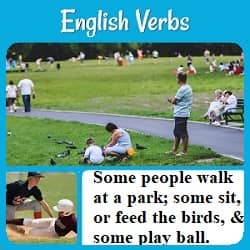Using English Pronouns
Pronouns can take the place of nouns in English sentences. Like nouns, they tell us who or what we are talking about.
English pronouns may be subjects or objects within a sentence, but unlike nouns, the form of personal pronouns changes depending on their position. (Personal pronouns are the most common. They're essential for speaking English. For other types of pronouns, see the section below this.)

The person speaking calls himself (or herself) ‘I.’
If he is the object of an action he says ‘me.’
Examples: I like ice cream. Mary sees me.
‘You’ is the person (or people) the speaker is talking to.
(‘You’ is used for one or more persons-- singular or plural-- with no change. Sometimes it isn’t clear who is included.This is why we sometimes use ‘all of you’, ‘you guys’, or in the southern U.S. ‘y’all.’) The form does not change whether it is subject or object:
Examples: You like ice cream. Mary sees you.
3rd person singular pronouns (when the speaker is talking about someone or something else) are ‘he’ (for men), ‘she’ for women, and ‘it’ for things.
Object forms are ‘him,’ ‘her,’ and ‘it.’
Examples: He likes ice cream. Mary sees him.
She likes ice cream. Mary sees her. It (a dog, for example) likes ice cream. Mary sees it.
When a speaker wants to indicate his whole group is involved in causing or receiving the action, he uses ‘we’ (as subject) or ‘us’ (as object).
Examples: We like ice cream. Mary sees us.The 3rd person plural forms are ‘they’ (masculine, feminine, or neutral) for subjects and ‘them’ for objects.
Examples: They like ice cream. Mary sees them.Types of Pronouns
The most common pronouns of all are the personal pronouns above. English has several more types of pronouns:
- possessive pronouns (as well as the related possessive adjectives),
- reflexive pronouns,
- demonstrative pronouns,
- relative (and interrogative) pronouns, and
- indefinite pronouns.
The personal and possessive pronouns, as well as possessive adjectives, are different for each person (I, you, he, etc.) They're shown in a table below those 2 sections. Reflexive pronouns also change, as explained in that section. (They don't fit into the table.)
Possessive Adjectives & Pronouns
Possessive pronouns (and possessive adjectives, which are followed by a noun) indicate ownership or relationship. Possessive adjectives are used before nouns.
Possessive pronouns are used without a noun.
Examples:
- “Give me back my book.
- You know it’s mine, even though you've kept it for a year.”
- “Joe is Larry’s best friend. He has been his friend since 6th grade.”
- “Larry is her boy friend, not mine.
- I don’t want to get involved;
- Larry is hers. “
- “We just had our 25th anniversary.
- When is yours?”
- “Ours is in 2 years. Our parents are celebrating their 50th anniversary, though!”
English Pronoun Forms
| Subject Pronouns | Object Pronouns | Possessive Adjectives | Possessive Pronouns |
|---|---|---|---|
| I | me | my | mine |
| you | you | your | your |
| he | him | his | his |
| she | her | her | hers |
| it | it | its | its |
| we | us | our | ours |
| they | them | their | theirs |
Here are the comparable forms for subject pronouns (SP), Object pronouns (OP), possessive adjectives (PsA), and possessive pronouns (PsP):
| SP | OO | PsA | PsP |
|---|---|---|---|
| I | me | my | mine |
| you | you | your | your |
| he | him | his | his |
| she | her | her | hers |
| it | it | its | its |
| we | us | our | ours |
| they | them | their | theirs |
The reflexive pronouns also change form, as explained below. So does who/whom. (Who is used as a subject; whom as an object.) The other types of pronouns do not indicate 'person' ( I, you, she, them), and they don't change depending on their place in a sentence.
Reflexive Pronouns
Reflexive pronouns are not used often in English. However, they’re useful if we need to emphasize the person involved.
They’re formed by adding -self or -selves to the possessive adjectives above—except 3rd person masculine & neutral. For those we use ‘him,’ ‘it,’ & ‘them.’
So the reflexive pronouns are: myself, yourself (or ‘yourselves’ when speaking to a group), himself, herself, itself, ourselves, and themselves.
Examples:
- “I haven’t tried it myself.”
- “Did you see the accident yourself, or are you just repeating what you heard?”
- "The witnesses themselves are the only ones who really know what happened."
- "Lawyers should read the law itself, not just a summary, before a difficult case."
Demonstrative Pronouns
Demonstrative pronouns or adjectives (this, that, these, those) indicate which thing is being discussed. This (singular) and these (plural) talk about things that are closer than that (singular) or those (plural).
Examples:
- A shopper might point to a pair of shoes and ask a clerk "Do you have these in brown?"
- We have a song about the past that says, "Those were the days, my friend." Someone might answer: "I think this is the best time to live."
- If friends are trying to choose a restaurant, one might say "I've heard this is a good one." While eating, another might say, "This is so good!" Later she might say, "That was the best Italian food I've had in years!
Indefinite Pronouns
Indefinite pronouns do not refer to a specific person or thing. They may refer to anyone or anything, everything, or nothing. They include: any, anybody, anyone, anything, each, either, both, some, somebody, someone, something, few, several, many, all, everybody, everyone, everything, nobody, none, and nothing.
Examples:
- Is everyone here? It's time for the meeting.
- Not yet. Something must have happened. Usually nobody is late like this.
- What about Sam and Erica?
- Both are here.
- Good! If anyone is essential for this meeting, it's Sam. Let's start, and maybe some will show up late.
Relative (& Interrogative) Pronouns
Relative pronouns like 'who' and 'which' start relative clauses. (The beginning of Complex Sentences explains the value of relative clauses. They save time while providing important information about the subject of a sentence. The Noun & Adjective Clauses section of that page explains relative clauses and gives some examples.)
Here are more examples:
- Charlie wrote a report on George Washington Carver, who had a big impact on southern agriculture over century ago. Carver, who was born a slave, found new uses for peanuts. Peanuts added nitrogen to soils which had been depleted by years of cotton farming.
Who, which, and what can also act as interrogative pronouns:
- Who won the world series this year?
- What was the final score?
- Mary likes chocolate ice cream, but Janet prefers vanilla. Which is your favorite?
More on Parts of Speech
How to use parts of speech in English: verbs, nouns, pronouns, adjectives, adverbs, & more.
What you need to know about English Nouns.
Learn the basic forms of English verbs to increase your confidence in English.
Home> English Grammar Lessons> English Pronouns.
Didn't find what you
needed? Explain what you want in the search box below.
(For example, cognates, past tense practice, or 'get along with.') Click to see the related pages on EnglishHints.
| site search by freefind | advanced |










New! Comments
What do you think about what you just read? Leave me a comment in the box below.